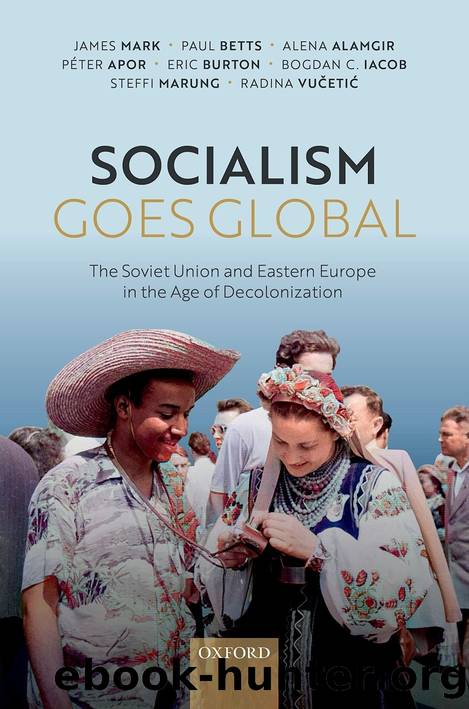Socialism Goes Global by Mark James;Betts Paul; & Paul Betts

Author:Mark, James;Betts, Paul; & Paul Betts [Mark, James & Betts, Paul]
Language: eng
Format: epub
Publisher: Oxford University Press USA - OSO
Published: 2021-12-13T00:00:00+00:00
The Cold War, Communism and Human Rights
After 1945 Communist advocates championed an expansive conception of human rights. However, economic, social and cultural rights were accorded secondary status in the Universal Declaration, as clearly noted in the debates about the ordering of the Articles. The first three Articles reflected the tradition of French liberty, equality and fraternity, with Articles 4â21 on civil and political rights, followed by Articles 22â26 on economic, social and cultural rights. The Soviet Union insisted that rights could not be conceived of outside the state, and that rights were thus coterminous with the state. Eastern European delegates fell in line, arguing in the 1948 UN General Assembly that the âsocial status of the individualâ was the âresult of the social and economic conditions in which the individual lives. That means that the civil and political status of the individual has become in a very great measure dependent upon his social status.â8 Various representatives from the developing world, in particular the Chilean and Indian delegates, concurred that self-determination should have its economic and political dimensions as well. On these points Eleanor Roosevelt, who chaired the meetings of the UNâs Human Rights Commission, had no sympathy with the Eastern European and Third World positions, countering that the state was not the agent to guarantee the fulfilment of these broader rights, and that social, economic and cultural rights therefore did not enjoy any legal status. Motions to put the set of social and economic rights on an equal footing with political and civil rights were supported by the majority of Latin American states and all of the Eastern European Communist states. They were ultimately defeated, prompting some commentators to describe the Soviet Union and its allies as âthe major losers in the human rights sweepstakesâ.9 That may have been so in this particular vote, but this SecondâThird World solidarity intensified with time.
At first the Eastern European countries in particular hardly looked like staunch champions of the Universal Declaration. Leaving aside the details behind the arduous negotiations surrounding the Declaration itself,10 it was widely noted that all of the Communist countries represented at the UN in 1948 (Belarus, Ukraine, the Soviet Union, Czechoslovakia, Poland and Yugoslavia), together with Saudi Arabia and South Africa, abstained from the final vote on ratifying the document. The Czechoslovak representative airily dismissed the Declaration as âneither bold nor modernâ, on the grounds that it was not comprehensive enough.11 According to Hungarian legal philosopher Imre Szabó, the Eastern Bloc countries abstained not because they were opposed to human rights in principle; rather, it was due to the Declarationâs failure to state the explicit duties of citizens along with rights; to the non-binding nature of the declaration; and to the western countriesâ refusal to condemn Fascism and colonialism in the document.12 The vote put the East at loggerheads with the West over human rights issues for years to come. In fact, the US and Great Britain blocked the accession of Poland, Hungary and Romania to the UN precisely because they were deemed in breach of human rights in these countries.
Download
This site does not store any files on its server. We only index and link to content provided by other sites. Please contact the content providers to delete copyright contents if any and email us, we'll remove relevant links or contents immediately.
Guns, Germs and Steel by Diamond Jared(2365)
Collapse: How Societies Choose to Fail or Succeed by Jared Diamond(1514)
The Emperor of All Maladies by Siddhartha Mukherjee(1438)
Transcendence by Gaia Vince(1139)
148424513X by Unknown(1077)
Seven Skeletons by Lydia Pyne(1067)
Civilization One by Christopher Knight(1003)
Sapiens - A brief history of humankind (Marathi) by Yuval Noah Harari(992)
The Rational Optimist: How Prosperity Evolves by Matt Ridley(965)
THE MASTER AND HIS EMISSARY by Iain McGilchrist(942)
Guns, Germs, and Steel: The Fates of Human Societies by Jared M. Diamond(927)
At Home by Bill Bryson(909)
Underworld The Mysterious Origins of Civilization by Graham Hancock(897)
How the Irish Saved Civilization by Thomas Cahill(895)
Marco Polo by Laurence Bergreen(893)
Atrocitology by Matthew White(878)
Ancient Iraq by Georges Roux(863)
The World Until Yesterday: What Can We Learn From Traditional Societies? by Jared Diamond(855)
Guns, Germs and Steel: The Fates of Human Societies by Jared Diamond(841)
